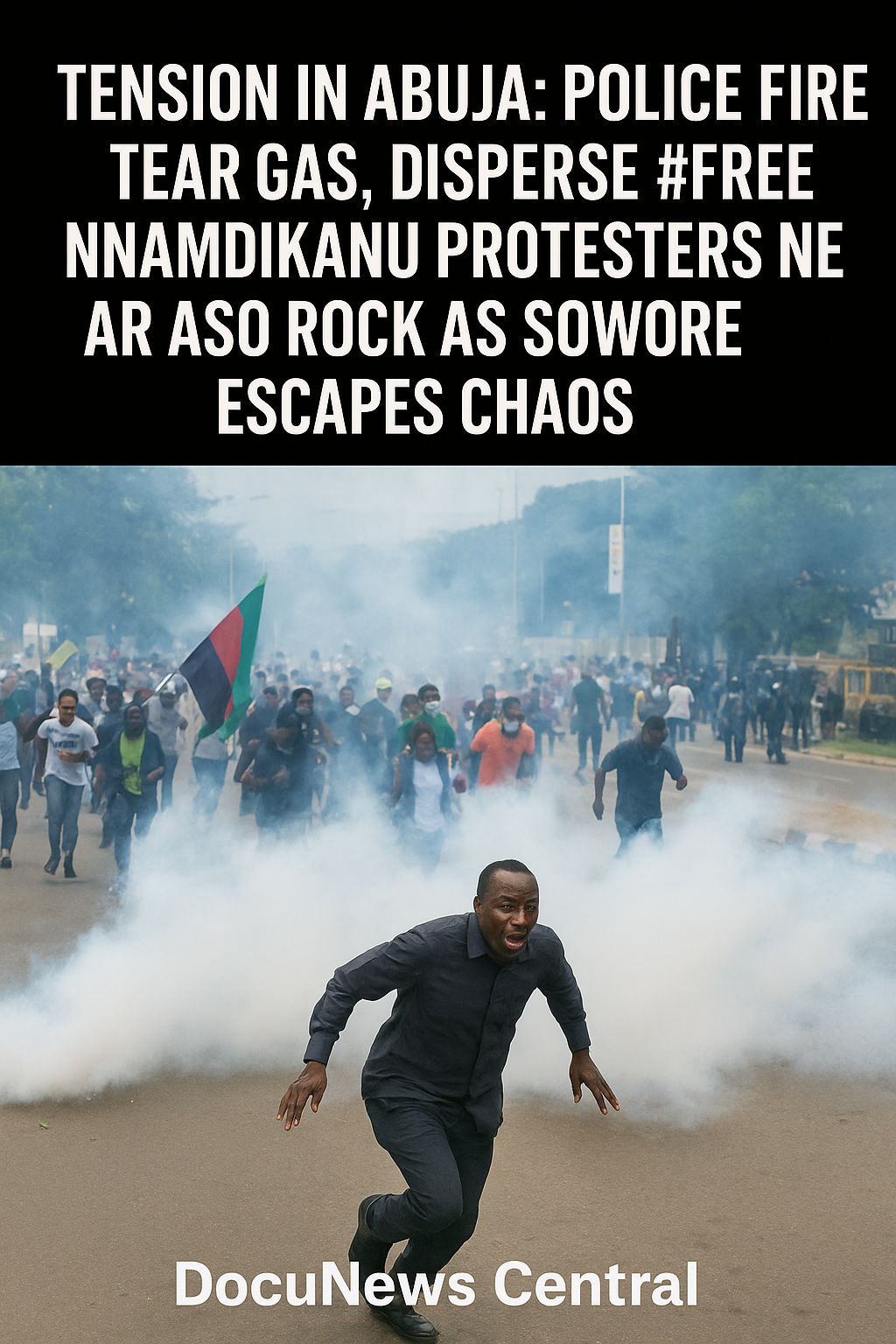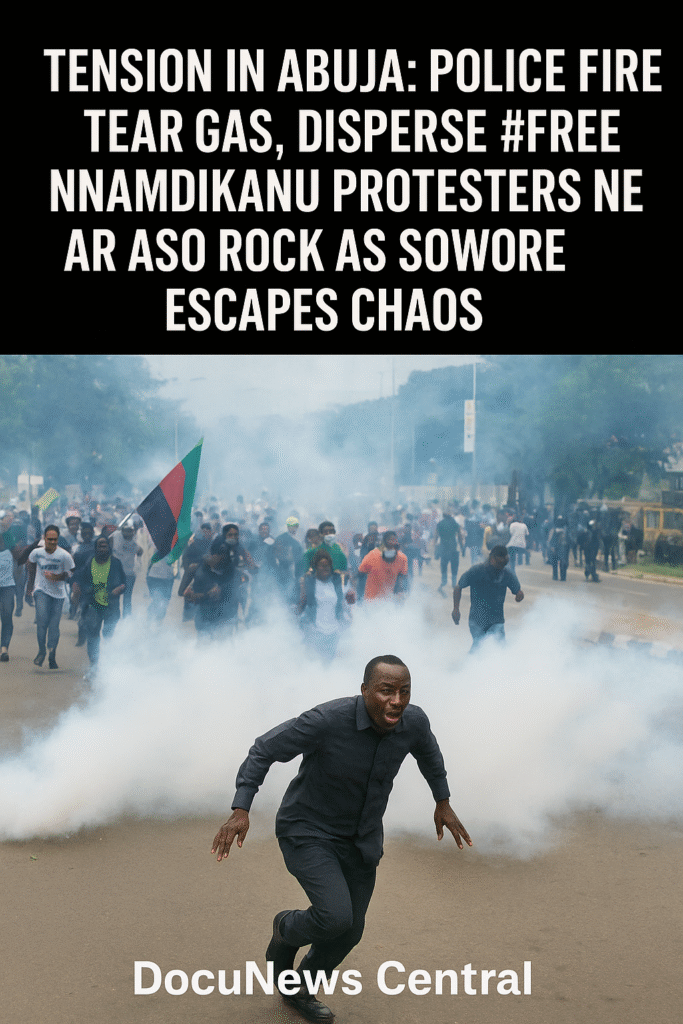

Abuja, Nigeria — The Nigerian capital descended into tension on Monday as security forces clashed with demonstrators calling for the release of detained separatist leader Nnamdi Kanu. Tear gas filled the air near the Three Arms Zone, and reports of gunfire sent protesters — including human rights activist Omoyele Sowore — fleeing from the scene. DocuNews Central confirms that the protest came just hours after a Federal High Court in Abuja restricted demonstrations around key government facilities, including the Presidential Villa at Aso Rock.
Protesters Defy Court Order and March Toward Aso Rock
Despite a court injunction banning protests near Aso Rock and other strategic areas, demonstrators gathered under the banner of the #FreeNnamdiKanuNow movement. The march began peacefully around the Federal Secretariat area, with protesters waving flags and holding placards demanding the immediate release of the IPOB leader, who remains in custody under terrorism-related charges.
However, tension escalated rapidly as security forces, including armed police and operatives from the Department of State Services (DSS), moved to disperse the crowd. Eyewitnesses reported that the demonstrators had attempted to move closer to the Presidential Villa despite police barricades along Shehu Shagari Way.
“We were only marching peacefully for Nnamdi Kanu’s freedom,” one protester told DocuNews Central. “Suddenly, police fired tear gas and people started running. We didn’t expect violence.”
Court Restrains Protesters from Sensitive Areas
According to Vanguard Newspaper, the Federal High Court issued an order (Suit No: FHC/ABJ/CS/2202/2025) barring Sowore and other activists from protesting around the Presidential Villa, National Assembly, Court of Appeal, and Eagle Square. The ruling followed a motion filed by the Federal Capital Territory Police Command, citing “national security concerns” and the need to prevent disruptions near high-security zones.
Despite this ruling, the activists insisted that their demonstration was peaceful and constitutionally protected. In a post on X (formerly Twitter), Omoyele Sowore vowed to defy what he described as an “illegal restriction on citizens’ right to peaceful assembly.”
Still, the police maintained that any protest near Aso Rock was a violation of the existing court order. Speaking to journalists, a spokesperson for the FCT Police Command stated: “While the Force respects the rights of citizens to peaceful protest, we will not tolerate actions that threaten the peace and security of the Federal Capital Territory.”
Chaos Erupts as Security Forces Move In
Shortly after noon, the demonstration turned chaotic. Video clips circulating on social media showed officers firing tear-gas canisters while protesters scattered in different directions. Some videos also captured what appeared to be warning shots fired into the air. Daily Trust reported that “live bullets” were discharged, although it remains unclear whether they were blanks, warning shots, or live ammunition.
According to eyewitnesses quoted by Western Post Nigeria, Sowore was seen fleeing the area when tear gas filled the air. He was reportedly chased by armed police officers but managed to escape unharmed. The activist later confirmed on social media that he was safe and described the use of force as “unnecessary and excessive.”
“We were not violent,” Sowore said in a video message. “The police attacked peaceful Nigerians simply for demanding justice. But we will not back down. The struggle for freedom continues.”
Police Justify Action as ‘Necessary to Maintain Order’
In a press briefing later that day, the FCT Police Command defended its actions. The spokesperson, SP Josephine Adeh, stated that the operation was necessary to enforce the court order and maintain public order. She emphasized that no protesters were seriously injured and that officers exercised “maximum restraint.”
“Our operatives acted professionally,” she said. “The protesters ignored several warnings and attempted to breach restricted zones. We used minimal force, including tear gas, to prevent a potential breakdown of law and order.”
The police further advised residents of Abuja to avoid “unauthorized gatherings” near the Three Arms Zone and to report suspicious movements to security authorities. They reiterated that the court’s injunction remains valid until further notice.
Background: Nnamdi Kanu’s Continued Detention
Nnamdi Kanu, leader of the proscribed Indigenous People of Biafra (IPOB), was first arrested in 2015 on charges of treasonable felony. After being granted bail in 2017, he fled the country but was later re-arrested in Kenya in 2021 and extradited to Nigeria. His trial has since dragged on, with his lawyers repeatedly demanding his unconditional release, citing alleged human-rights violations.
In July 2023, the Supreme Court ordered that his case be remitted to the Federal High Court for continuation of trial. Despite several legal motions and rulings, the Department of State Services has kept him in detention. The IPOB leader’s continued incarceration has triggered waves of protests across southeastern Nigeria and in Abuja, with supporters insisting that his trial is politically motivated.
According to Channels Television, today’s protest was the most significant in Abuja since early 2024, showing renewed public pressure on the federal government to release Kanu or expedite his trial.
Civil Rights Groups Condemn Police Action
Human-rights organizations quickly condemned the use of force against the protesters. The Human Rights Writers Association of Nigeria (HURIWA) called the incident “a blatant violation of the constitutional right to peaceful assembly.” The group urged the Inspector-General of Police to investigate the conduct of officers deployed to the protest site.
Similarly, Amnesty International Nigeria issued a statement urging authorities to exercise restraint and respect citizens’ rights. The statement read: “Using tear gas and live ammunition against peaceful demonstrators is unacceptable. The Nigerian government must release Nnamdi Kanu or ensure a fair and speedy trial.”
Omoyele Sowore, who also leads the Revolution Now Movement, accused the government of double standards. “When Nigerians protest peacefully, they are met with bullets and tear gas. But when corrupt politicians loot public funds, no one arrests them,” he said.
Political Reactions: Divided Opinions
The protest and its suppression have drawn mixed reactions from politicians and analysts. Supporters of President Bola Tinubu’s administration argue that law enforcement acted responsibly to prevent chaos. They insist that the nation’s capital must remain secure, especially around sensitive areas like the Presidential Villa and National Assembly.
However, opposition figures say the government’s approach reveals growing intolerance for dissent. Senator Shehu Sani described the crackdown as “a dangerous signal.” He tweeted: “If people cannot peacefully demand justice in Abuja, what message are we sending to the rest of the country?”
Some political commentators believe that the incident could further deepen ethnic and political tensions. “The government must learn to engage rather than suppress,” said public-affairs analyst Dr. Ifedi Okonkwo. “Each crackdown on protesters fuels more anger, especially among young Nigerians who already feel marginalized.”
Social Media Reaction: Hashtag #FreeNnamdiKanuNow Trends
Following the clash, the hashtag #FreeNnamdiKanuNow began trending across Nigerian social-media platforms. Videos showing protesters running, smoke from tear gas, and Sowore shouting at police went viral on X, Facebook, and Instagram. Many Nigerians expressed outrage, accusing the authorities of repressing fundamental freedoms.
One user wrote: “Why use guns and tear gas against peaceful protesters? Even in democracy, people can’t speak their minds?” Another posted: “This government fears peaceful protest more than corruption.”
On the other hand, some users argued that the protesters should have respected the court’s ruling. “There’s a legal process in place,” one commenter said. “Defying court orders is not the right path. The matter should be pursued through the judiciary.”
The debate continues, with analysts predicting that online activism will remain strong even if street protests face tighter restrictions.
What Comes Next for the #FreeNnamdiKanu Movement
Despite Monday’s crackdown, supporters of Nnamdi Kanu insist they will continue to press for his release. Sowore announced that more protests would be organized nationwide until Kanu is freed or granted a fair hearing. “They can’t tear gas justice,” he said. “Every Nigerian deserves freedom and fairness.”
Meanwhile, lawyers representing Kanu have filed new motions at the Federal High Court challenging the legality of his detention. They argue that keeping him in custody violates previous appellate judgments that called for his unconditional release. The federal government has yet to issue an official response.
Observers believe that unless the case is resolved soon, tensions could rise again, especially in the South-East. The police, on their part, have increased patrols around major public areas in Abuja, warning against “unlawful gatherings.”
Public Opinion: Growing Calls for Dialogue
As the dust settles, public opinion is increasingly shifting toward dialogue. Many Nigerians are urging the federal government to find a political solution rather than a purely legal one. Community leaders in the South-East have called for negotiations that could lead to peace and national reconciliation.
“We must not let the situation deteriorate into violence,” said Chief Emeka Okorie, a traditional leader from Anambra State. “The government should listen to the people. Justice and dialogue can coexist.”
Experts warn that prolonged detention without resolution could further polarize Nigerians. “Kanu’s case is not just about one man,” political scientist Dr. Grace Onyekachi noted. “It represents deeper issues of marginalization and governance. The sooner both sides talk, the better for national unity.”
Conclusion: A Nation Still Searching for Balance
The events in Abuja highlight the fragile balance between security and civil liberty in Nigeria. While the state seeks to maintain order, citizens continue to demand accountability and freedom of expression. Monday’s confrontation underscores the need for mutual understanding — one that upholds both the rule of law and the right to peaceful protest.
As the story develops, Nigerians will be watching closely to see how the government handles the aftermath of the protest and whether justice for Nnamdi Kanu finally comes through the courts or through negotiation.
For verified updates on this developing story, stay with DocuNews Central — your trusted source for factual, balanced, and timely reporting.
Sources: Channels TV, Vanguard Nigeria, Daily Trust, Western Post Nigeria, Amnesty International Nigeria.
Copyright © DocuNews Central. All rights reserved.






